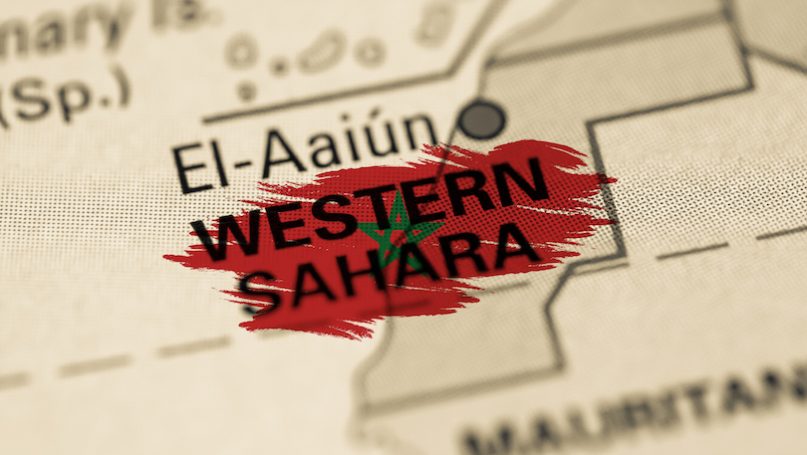
Rather like discussions of domestic policy issues involving sex, discussions of territory in international affairs are so sensitive that the topic must either be shifted to one less ‘earthy’ or expressed in the language of morality and law. The December 2020 announcement by the United States that it recognizes the sovereignty of Morocco over Western Sahara, now Moroccan Sahara, offers a case in point. Much of the news coverage and accompanying commentary focused not the importance of the territory for Morocco but on the quid pro quo: formal diplomatic relations with Israel as the price for recognition. The context offered for this version of the news story was that another Arab country had joined the United Arab Emirates, Bahrain and Sudan as part of the Abraham Accords.
Some reporting noted that formal diplomatic relations would now permit Israelis of Moroccan origin to visit their homeland by direct flights rather than via stopovers in third countries. Where news coverage and commentary addressed the annexed territory itself, it is often in the language of international law and international institutions, noting that the announcement did not alter the position of the United Nations and yet threatened the post-Second World War non-annexationist norm. The context offered for this version of the news story usually included reference to the transfer of Spanish Sahara to Morocco and Mauritania in 1975 by Spanish dictator Francisco Franco and recognition of their administrative responsibility by the United Nations. Sympathy for the underdog Sahrawi population as represented by the Polisario Front often featured in this reporting.
To that end, Polisario’s European representative Oubi Bechraya was quoted as saying that recognition by the United States “will not change an inch of the reality of the conflict and the right of the people to self-determination.” Bechraya is correct only in that the measurable political reality is that Moroccan control of the territory is unchanged because Moroccan military superiority over the Polisario is also unchanged. What has changed is American firms now face less business risk in Morocco and the abstract international legal right of self-determination claimed by Polisario is worth less than before the announcement.
Piercing the veil of poor journalism, what motivates Rabat’s determination to defend its southern possession? Territory represents power resources – strategic and economic – for the state in its struggle for survival against other states in an international system that remains fundamentally anarchic. Morocco’s primary security threat comes from Algeria. That is evident in the striking differences between their political regimes, in that they are the three largest arms importers in Africa, and in Algerian sponsorship for Polisario. In the raw calculus of national power, Algeria exceeds Morocco in both the size of its military manpower/civilian workforce and in its strategic depth. There are 44 million Algerians versus 37 million Moroccans. Algeria has more than three times the land area of Morocco without Moroccan Sahara. The addition of Moroccan Sahara increases the land area and thus the strategic depth of Morocco by more than one third. Just as importantly, annexation denies Algeria a client state in the form of a hypothetical Polisario run Sahrawi Arab Democratic Republic that would leave Morocco effectively surrounded by hostile states on all of its land borders save for the tiny Spanish exclaves of Melilla and Ceuta.
Morocco without Moroccan Sahara is relatively poorly endowed with natural resources compared with oil and helium rich Algeria. Moroccan Sahara presents Morocco with additional large phosphate deposits, plus deposits of iron, titanium, vanadium, zirconium, and uranium. Oil and gas deposits are also suspected. Moreover, under a 2005 Fisheries Agreement with the European Union, Morocco is paid to permit catches by European fishers in the waters off the combined coasts of historical Morocco and Moroccan Sahara. Land transport across the territory provides an alternative to maritime transport for trade with markets in West Africa. Finally, Moroccan Sahara may offer ambitious young Moroccans an alternative to emigrating to Western Europe.
The economic and strategic benefits of this annexation thus clearly exceed the cost in international criticism. Yet journalists and commentators appear willing to describe only some of the economic benefits, and often disapprovingly. Descriptions of the strategic benefits are simply too naughty, too honest about geopolitical competition, to be repeated in polite company. The unfortunate result is that news audiences are left puzzled by the seeming irrationality of Rabat’s entirely rational decision.
Prudery inevitably invites hypocrisy. In this case, it takes the form of denunciations of the announcement by United States by states that continue to occupy disputed territory. Surely the most egregious hypocrisy was expressed by Russian Deputy Foreign Minister Mikhail Bogdanov, who criticized that the announcement as “unilateral” and a “violation of international law.” That he could say this without blushing in embarrassment is a tribute to his skills as a diplomat. Bogdanov was Deputy Foreign Minister when Russia annexed Crimea in 2014. International affairs audiences would be better informed if journalists abandoned their reluctance to address territoriality of states without changing the subject or coating their reporting in the language of international law. Diplomats would still practice hypocrisy but it could then be treated to the laughter it merits.
Further Reading on E-International Relations
- Self-Determination as Resistance: Sahrawi and Palestinian Struggle for the UN
- Africa’s COVID-19 Exceptionalism? Same Problems, Different Locations
- Opinion – Sovereignty First: US Support on Bangladesh’s Terms
- Opinion – Human Rights Concerns as Somaliland Seeks International Recognition
- Opinion – Russian Motives in Ukraine and Western Response Options
- Opinion – Refugee Hierarchy in Western Responses to the Ukrainian Crisis